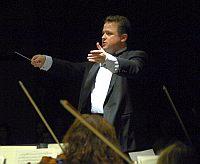Recovery Dollars to Music Organizations
The National Endowment for the Arts is distributing funds from the American Recovery and Reinvestment Act, the big stimulus plan signed into law by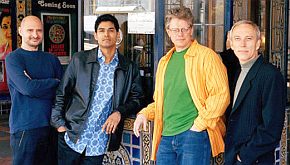 President Obama on Feb. 17, 2009. It took five months to make it happen, but the funds are now becoming available.
President Obama on Feb. 17, 2009. It took five months to make it happen, but the funds are now becoming available. Here's how it trickles down: The total package is $787 billion, the NEA portion is $50 million. The current distribution: $29.78 million — of that, 99 grants, totaling $4.45 million, went to California arts organizations. These are the recovery music and dance grants in the state:
- Cabrillo Festival of Contemporary Music, $25,000
- CounterPulse, $25,000
- Cypress Performing Arts Association (Cypress String Quartet), $25,000
- Joe Goode Performance Group, $50,000
- Alonzo King's LINES Ballet, $50,000
- Kronos Performing Arts Association, $50,000
- Long Beach Opera, $50,000
- Los Angeles Chamber Orchestra Society, $50,000
- Monterey County Symphony Association, $50,000
- Monterey Jazz Festival, $50,000
- ODC/Dance, $50,000
- ODC Theater, $25,000
- Pacific Chorale, $50,000
- Sacramento Philharmonic Orchestra, $25,000
- San Francisco Symphony, $50,000
- Santa Cecilia Opera and Orchestra Association, $25,000
- Santa Monica Symphony Association, $25,000
- World Arts West (S.F. Ethnic Dance Festival), $50,000
- Yerba Buena Arts and Events, $25,000
Good Old Vallejo Symphony
When I noticed in the Vallejo Symphony season announcement Monday that upcoming is its 78th year, I wondered if, after the demise of the ancient Oakland and the San Jose symphonies, whether Vallejo might just hold the title of California's second oldest orchestra, behind the 98-year-old San Francisco Symphony.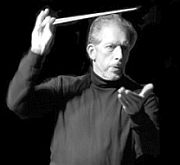
Not so, says Vallejo's Tim Zumwald: "My research shows we are seventh, tied with Bakersfield. There are a lot of Southern California orchestras ahead of us," including Pasadena and Los Angeles. "We were founded the same year as the San Francisco Ballet, in 1931, and consider ourselves survivors. We are proud of saying that we were founded during the Great Depression and that a recession will not stop us."
On opening night, Sept. 19, Music Director David Ramadanoff conducts Handel's overture to Royal Fireworks Music, Beethoven's Piano Concerto No. 3 in C Minor (featuring soloist Wonny Song), and Brahms' Symphony No. 1 in C Minor. The venue is Hogan Auditorium in Vallejo.
The rest of the season: Jan. 9 (Michael Daugherty's Dead Elvis, Mozart's Serenade in D Major, and Beethoven's Symphony No. 7 in A Major), March 27 (Strauss' Concerto No. 1 for Horn, with soloist Meredith Brown and Mozart's Symphony No. 39 in E-flat Major), and May 1 (Dvořák's Carnival Overture, Kernis' Air for Violin and Orchestra, with soloist Dawn Harms, John Williams' theme from Schindler's List, Kreisler's Praeludium and Allegro, and Tambourine Chinoise, Sibelius' Symphony No. 2 in D Major).
Season tickets are $120 for adults, $110 for seniors (age 60 and up), and $45 for students (ID required). The new Flextix Pass offers four concerts for the price of three. Individual concert tickets are $40 for reserved and $15 for students.
'A Seasoned Opera Fan?'
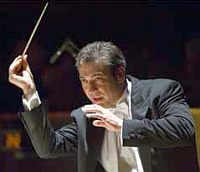
So asks the advertisement from the San Francisco Opera. If you qualify, the marketing department suggests that you "Enjoy the many new operas we present this season."
Be still my heart! American premieres and important debuts coming to the War Memorial again, as they used to, with great regularity under the leadership of Kurt Herbert Adler?
Not exactly. SFO is offering some fine works, but they are new only if you're Methuselah.
- Richard Strauss' Salome had its Dresden premiere in '05 — 1905, that is.
- Verdi's Otello bowed at Teatro alla Scala, Milan, in 1887.
- Gounod's Faust was first presented in the Paris Opèra-National, 1859.
- Wagner's Die Walküre, arriving newly after a two-year delay of the Ring, premiered in Munich's National Theater in 1870.
Perhaps equally strange is the juxtaposition with the other part of the ad:
New to Opera? We recommend the following time-honored favorites:
* Verdi's suspenseful Il trovatore, propelled by a stream of melody and packed with rousing choruses, opens the season under the helm of new Music Director Nicola Luisotti and features an all-star cast with Sondra Radvanovsky, Stephanie Blythe, Marco Berti, and Dmitri Hvorostovsky.
* From Puccini, the beloved composer of La bohème and Madama Butterfly, comes Il trittico (Il tabarro, Suor Angelica, Gianni Schicchi), a unique experience of three one-act works, a perfect operatic sampler, with an ideal cast led by Patricia Racette in all three.
* Donizetti's The Daughter of the Regiment, a delightful romp full of esprit de corps and innocent romance that will lift your spirits, features the dazzling Diana Damrau and renowned Juan Diego Flórez.
* Mary Dunleavy and Matthew Polenzani star in Mozart's sparkling and laugh-out-loud comedy, The Abduction from the Seraglio.
* Puccini's The Girl of the Golden West, a romantic love triangle set in California's Gold Country, is told through a brilliant, blazing score, with the incomparable Deborah Voigt in the title role.
Surely, it's not "new" and "old." Could it be "light" and "heavy"? No. Oh, maybe it's just marketing.
A Windfall of Musicians

In California, especially in the South, there has always been an awareness of the impact of the pre-World War II exodus of artists, musicians, and composers from Hitler's Europe — Otto Klemperer, Igor Stravinsky, Kurt Weill, Erich Korngold, Arnold Schoenberg, Bertolt Brecht, Thomas Mann, and scores of others — but there is now a comprehensive study of this significant brain drain that in many ways put Hollywood and SoCal on the map.
In Jonathan Kirsch's review of Dorothy Lamb Crawford's A Windfall of Musicians: Hitler's Emigres and Exiles in Southern California, the great exodus is described:
To spare themselves from a culture war that soon turned into a shooting war, artists, writers, and composers — both Jews and nonJews — began to flee the continent in search of a safe haven. Because the movie industry had started making "talkies" a few years earlier, Southern California turned out to be such a place.Studio work was available for men (and a few women) previously showcased in the theaters and concert halls of Europe. What had been regarded as a cultural desert suddenly flowered with transplanted musicians.
It was not all peaches and cream:
Frederick Hollander may have composed Falling in Love Again for Josef von Sternberg's The Blue Angel — the German movie that made Marlene Dietrich a star — but the head of Paramount's music department dismissed his early studio efforts. At one point, Hollander managed to eat only because his wife was willing to shoplift food from local grocery stores."For most European composers," writes Crawford, "Hollywood fully justified the title of Bertolt Brecht's 1941 poem about Los Angeles, On Thinking About Hell."
Yet, as Crawford reminds us, Los Angeles saved their lives as well as their livelihoods.
For classicists as well as motion picture composers, Los Angeles was a culture shock. Vicki Baum, a former professor at the Vienna Academy of Music and author of Grand Hotel, rhapsodized about "all the colors of a wild Van Gogh palette" and confessed that she "stayed drunk for weeks with this sun and air and the beauty of the hills."
But Klemperer was aghast: "My God, my God," he remarked, "I didn't know that such a lack of intellectuality existed." And Arnold Schoenberg was reduced to giving private music lessons. "From him," cracked Oscar Levant, one of his more famous students, "I learned that modernism is not merely a matter of hitting the keys with your elbows and seeing what happens."
Fame and Loyalty: Often in Conflict
It's interesting to follow careers of young musicians who got their start, or at least a significant initial push, in San Francisco. There are those who just drop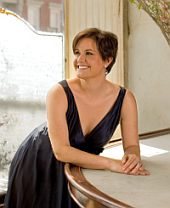
On the one hand, Susan Graham, Thomas Hampson, and Ruth Ann Swenson, many other stars claim their Merola roots, and support their alma mater in various ways. Conversely, however, when you look up Anna Netrebko's biography: There is no mention of Merola — small program versus big star.
Cellist Hai-Ye Ni — associate principal cellist for the New York Philharmonic, later principal cellist of the Philadelphia Orchestra — while acknowledging "musical education with Irene Sharp at the San Francisco Conservatory," is silent on the subject of the all-important school facilitating her immigration from Shanghai and giving her career the initial start: Faith France's San Domenico School Virtuoso Program.
And now we have another locally launched talent, soprano Elza van den Heever — of the S.F. Conservatory, the Merola Program in 2003 and 2004, an Adler Fellowship, and who made her recital and mainstage debut here — whose Columbia Artists Management bio does include references to her local beginnings.
Her career has taken off: She had her Santa Fe Opera debut as Donna Anna, July 18 through Aug. 27, a role she first performed in the War Memorial under unusual circumstances; she is a resident artist at Frankfurt Opera, with role debuts scheduled as Vitellia in Mozart’s La Clemenza di Tito and as Anna Bolena in a concert version of the Donizetti opera. Van den Heeven's scheduled appearances also include the Dallas Opera and Vienna’s Theater an der Wien.
American Opera Projects
Next time somebody says "we should support new American opera," do not reply: "Sure, but ..." Take a look at American Opera Projects, and see what is available. There is a wealth of material there.
Music in the Mountains Appointment
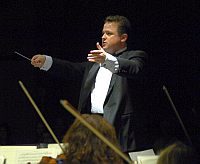
Vajda completed his tenure as assistant conductor of the Milwaukee Symphony Orchestra in 2005, then became resident conductor of the Oregon Symphony Orchestra. Born in 1973 in Budapest, the son of soprano Veronika Kincses, Vajda had served as founder and artistic advisor of the Valley of the Arts Summer Festival in Hungary, and as guest conductor of the Hungarian State Opera (1998-2003).
In recent years, he guest conducted with the Vienna Philharmonic and Vienna State Opera Chorus at the Salzburg Festival, the Mostly Mozart Festival, Chicago's Grant Park Festival, Lanaudière Festival, Round Top Festival in Texas, and Woodstock Mozart Festival, as well as the festivals of Avignon and Strassbourg in France.
Real Estate Meltdown in Walhalla
Conductor Ádám Fischer puts the Wagner Ring now performed in a new production in Budapest in an economic context, as a fable for our times:"It's about too much borrowed money, it's the same story," he said referring to the plot in which the downfall of the gods is assured when they get giants to build a new palace that chief god Wotan pays for with stolen Rhine gold."There's a Hungarian expression which means 'to build a house that even gods can't afford'," Fischer said. "That happens, and that is what everybody has in this country, and every second or third house in America."
Hungary has been hit hard by the financial meltdown and its economy is expected to shrink by almost seven percent this year.
Nabucco, the Pipeline
Isn't it strange that a pipeline planned to bring natural gas from the Caspian to Central Europe would use the Italian version of a Babylonian king's name?
Besides wars here and there and everywhere, Nebuchadnezzar had major construction projects going, so perhaps that's the reason? But Italy is not part of the consortium.
Turns out the pipeline is named after Verdi's Nabucco. Representatives of the five countries involved in the project attended a performance of the opera in Vienna back in 2003, and figured it would be the right name.
Where Are the Mozarts of Today?
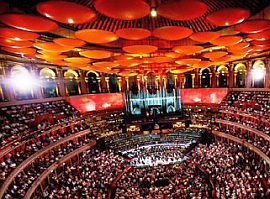
The Bay Area is rich in talented young musicians, and some composers in their 20s get an occasional chance to have their works performed. What would help their careers a great deal — and allow audiences to hear this important emerging body of work — is an occasion here such as the BBC Proms is offering to them.
As reported by Richard Fairman in The Financial Times, winners of the BBC Young Composers Competition this year — ages 12-16 — are invited to compose a fanfare to be performed at the series' climactic "Last Night at the Proms," televised and broadcast live from Royal Albert Hall globally.
The competition, now in its 11th year, is well established in promoting youthful efforts at composition, not least through broadcasts on BBC Radio 3, but playing the winning entries of some teenage tunesmiths alongside "Land of Hope and Glory" should certainly raise the stakes a bit.
Wouldn't such an idea play well, say, at Davies Symphony Hall? After all, much smaller organizations than the San Francisco Symphony — especially the California Symphony — have been active in promoting young talent, so perhaps it's time ...
In addition to the contest and fanfares, five young composers are scheduled to be part of main evening Proms programs: Ben Foskett, born 1977, From Trumpet, Prom 24 on Aug. 2; Helen Grime, 1981, Virga, Prom 30 on Aug. 7 ("picture in sound of cloud formations from violent storm to clear blue sky"); Anna Meredith, 1978, Left Light, Prom 32 on Aug. 9; Jörg Widmann, 1973, Con brio, Prom 18 on July 29 ("trying to 'take over' Beethoven’s style of expression"); and Ryan Wigglesworth, 1979, The Genesis of Secrecy, Prom 8 on July 22 ("features a big orchestra including a huge battery of percussion").
Roger Wright, director of the BBC Proms, says there is always a desire to feature new music on "Last Night" because of its huge media exposure. The only question is how to present it. Prom-goers with long memories will recall the outrage in 1995 when Harrison Birtwistle’s Panic was allowed to interrupt the flag-waving for eight minutes.Last year Anna Meredith had five minutes of fame when her work froms brought together orchestras around Britain by television link in a brief cacophony. The "young" Scottish composer’s reward is a new work in the main season this year – though at 31 she, too, is hardly a youngster.
Being a classical composer must be the only profession where someone can still expect to be called "young" when pushing 50. Never mind the latest software for music notation – the modern tools of the trade should include antiwrinkle cream and pension plans.
Don't Stop the Music
The National Philharmonic orchestra, with 85 years of tradition and a rich repertoire, can now play at your house for a reasonable fee ...
That's a newspaper advertisement from the Belgrade Philharmonic, whose 96 musicians are seeking bookings for "weddings, funerals, baptisms, birthdays, divorces, saints' days, and inaugurations." For those not familiar with the concert scene, the ad informs: "We own appropriate attire for all occasions."
Neil MacDonald reports from Belgrade that Serbia's flagship classical music ensemble, squeezed by the economic downturn, is pleading for help.
After scraping through a decade of wars and sanctions, the formerly respected Philharmonic bounced back after Serbia's October 2000 "democratic revolution." Ivan Tasovac, the director appointed the following year, brought in youthful, foreign-trained musicians and has tried to attract more big-name international guest conductors and soloists.
But rising living costs, combined with meagre salaries, have meant musicians' living standards have never quite recovered to prewar levels. "These are classically-trained musicians, who need to support themselves by playing in nightclubs, backing up raunchy folk-pop singers," Tasovac says.Tijana Milosevic, first violinist and concert master, earns one of the Philharmonic's highest salaries, nearly €700 ($970) a month. Although double Serbia's average net wage, this is not enough for the pricey capital city, she says. "If my salary suddenly became €2,000, I wouldn't work anywhere else. Until that day, we have to survive." As a mother with her second child on the way, she depends on side jobs as a session musician.
But in that respect she hardly differs from millions of public sector employees, who drive taxis or serve drinks as second jobs. The Philharmonic depends on the state for roughly €1.5m a year, including some €225,000 from the culture ministry for concert programs. In Tasovac's view, this is money well spent for the country of 8 million people, struggling to settle into the new European order: "The Philharmonic has brought many top-level international musicians here at low cost, mainly as a friendship gesture."
Nigel Kennedy, the British violinist, was the first big name to return after the 1999 Kosovo war and has been several times since. Zubin Mehta, the Indian conductor, who came in the orchestra's 1960s heyday, returned in 2005 and set up a fund for new instruments. Sarah Chang, the violinist, appeared this year.
But Nebojsa Bradic, culture minister, insists he has no power to boost Philharmonic salaries, mostly under €400.
Conductor Edward Downes
Sir Edward Downes, former Royal Opera chief conductor and Australian Opera music director, died Monday in a Swiss clinic, at age 85, along with his wife Joan, 74.The Verdi specialist had been in ill health for a decade and his wife had terminal cancer. They traveled to the "suicide clinic" to end their lives together.
Downes was principal conductor of the BBC Philharmonic from 1980 to 1991; he performed mostly in the U.K. and Australia, and did not become a member of the jetsetting, more famous, group of conductors in the 1980s.

